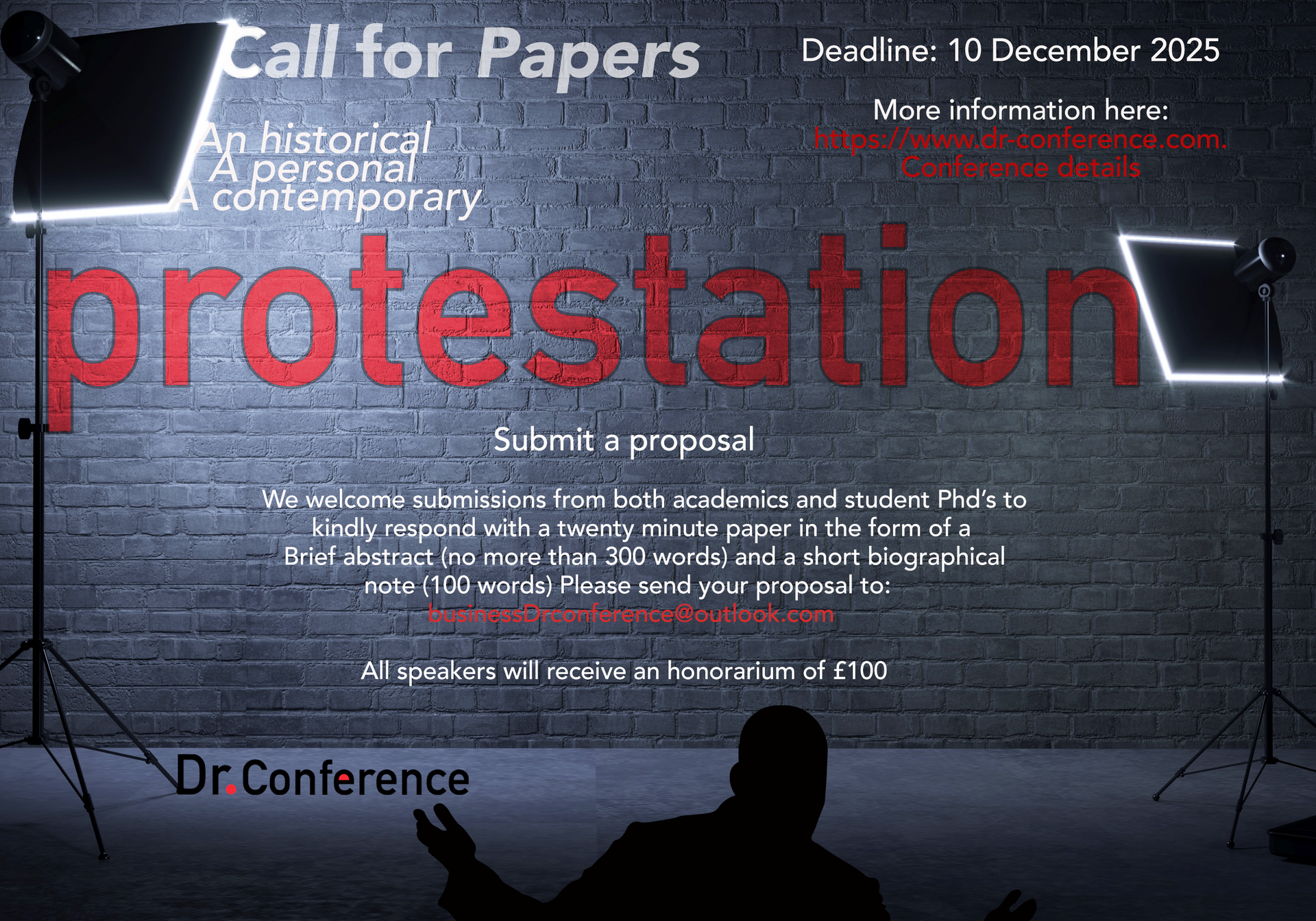
Theme
The theme for the upcoming conference is protestation, a term that can be interpreted in various ways. Specifically, it refers to a formal, emphatic, and solemn declaration of objection, affirmation, or dissent. Dr. Conference would like to encourage you to align your research within the framework of the noun protestation, drawing upon the contexts outlined below. We invite you to explore your interpretations, no matter how tenuous the connections may seem; we are open to all creative avenues and insights. For instance, your interpretation may manifest through various mediums such as the arts, design, and music, as well as film, television, and comedy. Dr. Conference fully recognises the potential breadth of meaning encompassed within the term protestation, acknowledging its significance across different fields and disciplines. In light of this understanding, we have devised three explainers to help clarify and facilitate the mechanisms through which your proposal can effectively fit within the overarching theme:
An historical protestation
Your thesis may draw inspiration from a historical protestation, a concept rich in significance and context. The history of human protest is remarkably deep and diverse. Traditionally, the term protestation refers to a public declaration or oath, such as those documented in the 1642 English Protestation Returns, where men pledged their allegiance to the Protestant faith during a tumultuous era. Broadly speaking, the narrative of protest spans centuries, featuring numerous large-scale public demonstrations and movements challenging injustice and authority. This history begins with medieval uprisings like the Peasants' Revolt of 1381 and extends to contemporary movements, including the powerful Civil Rights Movement and the global celebration of Earth Day. Throughout time, several key protests have emerged as pivotal moments: the 1819 Peterloo Massacre, where demonstrators faced brutal repression; the 1908 Women's Suffrage rally, which fervently advocated for women’s voting rights; the 1955 Montgomery Bus Boycott, a landmark event in the campaign against racial segregation; and the 2003 Stop the War march in London, which showcased widespread opposition to military conflict. Additionally, your research may intersect with art history, illustrated by movements such as Dada, Expressionism, or Conceptualism. These artistic movements often captured the essence of their era, opposing prevailing norms and challenging societal conventions. Moreover, your inquiry may delve into a religious context. For instance, during the harsh Canadian winter of 1903, members of a Christian sect known as the Doukhobors became the first modern naked protestors. This act of defiance resonated with the beliefs of the Anabaptist and Mennonite groups in Western Europe. The Russian Doukhobors vehemently rejected ecclesiastical hierarchy, traditional Orthodox liturgy, and contemporary social structures. Instead, they embraced individual spirituality, simplified forms of worship, and a commitment to anti-modern communitarianism, underscoring the interconnectedness of faith and activism throughout history.
A personal protestation
A personal protestation can encompass a variety of dimensions, ultimately referring to an auto ethnographic circumstance or a deeply personal history that profoundly shapes an individual's worldview. It often serves as a reflective lens through which one can examine and express their belief system, representing a powerful and heartfelt affirmation of one’s convictions or statements, particularly in contexts where those beliefs may be met with skepticism or outright doubt by others. This form of expression goes beyond the simple act of raising one’s voice; it embodies a profound demonstration of disapproval, disagreement, or objection on a deeply personal level to societal norms, injustices, or prevailing ideologies that may be taken for granted. At the psychological level, one may analyze the intricate reasons behind why individuals engage in protest, considering themes such as criminality or the nuanced personal critiques directed at sociocultural inequality or dysfunction prevalent in society. This complex interplay of emotions and beliefs is often communicated through various forms of expression, including critical writing, evocative art, striking photography, dynamic dance performances, compelling acting, and powerful music. Each of these artistic outlets serves to illuminate the depths of human experience and highlight the urgent need for change in the face of enduring challenges. Additionally, your interpretation may be framed through a comedic lens; for example, humor and laughter can serve as a powerful tool in social protest, engaging audiences in ways that provoke thought while entertaining. Another critical area of protestation is the realm of intellectual freedom, which allows for a deeper examination of freedom of expression more traditionally referred to as free speech. This facet of intellectual freedom is profoundly concerned with the generation of information and the voicing of dissenting opinions. Given that all of the information—whether presented as numerical data, text, images, sounds, or electronic and optical communication—that is the subject matter of information science is protected by the principle of intellectual freedom, it is customary to discuss this concept in relation to politics, science, various forms of academic research, religion, and social commentary. However, it is equally vital to note that intellectual freedom encompasses all forms of artistic expression as well, thereby broadening the discussion to include a diverse array of voices and perspectives.
A contemporary protestation
Contemporary life is fraught with sociocultural inequality and dysfunction, a reality that has led many individuals to vent their anger and disdain through various forms of protest. This protestation, which can take several forms, may be observed not only through music, drama, and film but also prominently in television and other media platforms. In exploring this theme, your thesis may interpret protestation within a political context; for instance, the legitimacy of the political systems in Western democracies is currently experiencing a significant crisis. Political scientists have repeatedly supported this claim by demonstrating how citizens have grown increasingly distant from traditional political parties, how the public has become more critical of political elites and institutions, and how widespread distrust in governmental authorities has emerged (Dalton 1999). Your research may interpret activism through the lens of protest, examining whether such activism is situated within a global framework or alternatively viewed from a national or regional perspective—it is undeniably on the rise across multiple contexts. The epidemiology of protest is indeed an intriguing and vital field of study that delves into the patterns, causes, and consequences of collective demonstrations and public dissent. This area of study seeks to understand not only the demographics of those who participate in protests but also the complex socio-political contexts that motivate diverse individuals and groups to take to the streets in unison. By thoroughly analysing a variety of factors, such as demographic characteristics, the influence of social media, and pertinent historical precedents, researchers can gain deeper insights into how protest movements emerge, spread, and sometimes dissipate over time. An exploration is crucial for illuminating the broader societal impacts of protests, including their capacity to effect meaningful change in policies, elevate awareness about pressing social issues, and galvanise communities around shared, urgent goals. Understanding these dynamics can provide valuable lessons and insights for both activists and policymakers alike, facilitating informed decision-making and strategic planning for future movements. What about the psychological manifestations of protest? By acknowledging that protest encounters are invariably emotionally laden, relational, hybrid, corporeal, and contingent, a myriad of possibilities opens up for breaking the silences that divide us. This understanding assists in overcoming ontological divisions, such as the binary distinction between activist and non-activist. From these conversations, numerous questions arise, such as: what roles do we assume in protest situations? What are our emotional responses during these encounters? How can we transcend pre-determined identities and more critically examine
our own identities within the broader landscape.

